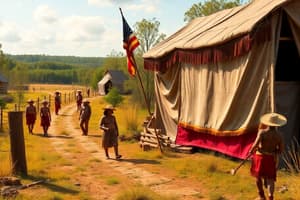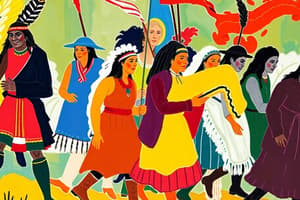Podcast
Questions and Answers
What was the main ambition of Andrew Jackson's presidency?
What was the main ambition of Andrew Jackson's presidency?
- To establish a national bank
- To strengthen diplomatic relations with European countries
- To expand United States westward across the continent (correct)
- To promote industrialization in the United States
What was the Indian Removal Act signed by Andrew Jackson in 1830?
What was the Indian Removal Act signed by Andrew Jackson in 1830?
- It provided financial aid to Native American communities
- It prohibited the forced relocation of Native American tribes
- It allowed the president to exchange lands west of the Mississippi for the lands Indian tribes lived on in the Southeast (correct)
- It granted voting rights to Native Americans
What event became known as the Trail of Tears?
What event became known as the Trail of Tears?
- The establishment of reservations for Native American tribes
- The forcible removal of the Cherokee nation west (correct)
- The migration of Native American tribes to the East Coast
- The signing of a peace treaty with Native American tribes
How did Andrew Jackson view Native Americans?
How did Andrew Jackson view Native Americans?
Before becoming president, in which war did Andrew Jackson serve as a general?
Before becoming president, in which war did Andrew Jackson serve as a general?
What was the Supreme Court's initial decision in the Cherokee Nation v. Georgia case?
What was the Supreme Court's initial decision in the Cherokee Nation v. Georgia case?
What was the outcome of the Treaty of New Echota?
What was the outcome of the Treaty of New Echota?
What was the role of General Winfield Scott in the Trail of Tears?
What was the role of General Winfield Scott in the Trail of Tears?
What was the estimated death toll of the forced relocation of Native Americans in the 1830s?
What was the estimated death toll of the forced relocation of Native Americans in the 1830s?
What was the primary reason for the Cherokee's opposition to the Treaty of New Echota?
What was the primary reason for the Cherokee's opposition to the Treaty of New Echota?
Which Native American tribes were known as the 'Five Civilized Tribes'?
Which Native American tribes were known as the 'Five Civilized Tribes'?
What was the main reason behind the Indian Removal policy?
What was the main reason behind the Indian Removal policy?
Which event led to the advocacy for the removal of Native Americans in the 1830s?
Which event led to the advocacy for the removal of Native Americans in the 1830s?
What was the impact of the Indian Removal Act of 1830?
What was the impact of the Indian Removal Act of 1830?
What was the primary motivation for the support of the Indian Removal Act of 1830?
What was the primary motivation for the support of the Indian Removal Act of 1830?
Flashcards
Jackson's Main Ambition
Jackson's Main Ambition
To expand the United States westward across the continent.
Indian Removal Act of 1830
Indian Removal Act of 1830
Allowed the president to exchange lands west of the Mississippi for Indian lands in the Southeast.
Trail of Tears
Trail of Tears
The forcible removal of the Cherokee Nation west.
Jackson's View of Native Americans
Jackson's View of Native Americans
Signup and view all the flashcards
Jackson's War Service
Jackson's War Service
Signup and view all the flashcards
Cherokee Nation v. Georgia Initial Ruling
Cherokee Nation v. Georgia Initial Ruling
Signup and view all the flashcards
Treaty of New Echota Outcome
Treaty of New Echota Outcome
Signup and view all the flashcards
General Winfield Scott's Role
General Winfield Scott's Role
Signup and view all the flashcards
Death Toll of Forced Relocation
Death Toll of Forced Relocation
Signup and view all the flashcards
Cherokee Opposition to Treaty
Cherokee Opposition to Treaty
Signup and view all the flashcards
'Five Civilized Tribes'
'Five Civilized Tribes'
Signup and view all the flashcards
Reason for Indian Removal Policy
Reason for Indian Removal Policy
Signup and view all the flashcards
Event Leading to Removal Advocacy
Event Leading to Removal Advocacy
Signup and view all the flashcards
Impact of Indian Removal Act
Impact of Indian Removal Act
Signup and view all the flashcards
Motivation for Supporting Removal Act
Motivation for Supporting Removal Act
Signup and view all the flashcards
Study Notes
Indian Removal Act and the Trail of Tears
- Various Native American tribes fought on both American and British sides in conflicts lasting until 1821
- Andrew Jackson fought with and against various Native American tribes, including the Creek and Seminole
- Brutal fighting and massacres occurred at Fort Mims and Talluschatchee in 1813
- Jackson was involved in imposing treaties on Native American tribes for U.S. land expansion
- Jackson pursued Indian removal policy to push tribes west, ostensibly to relieve tensions
- Cherokee, Choctaw, Chickasaw, Seminole, and Creek were known as "Five Civilized Tribes"
- The discovery of gold on Cherokee lands in 1828 led to removal advocacy in the 1830s
- More than 100,000 Native Americans lived in the Southeast before the Indian Removal policy
- The Indian Removal Act of 1830 allowed the president to exchange lands west of the Mississippi River for those on which Native Americans currently resided
- The act was supported by whites eager to expand west, but opposed by groups like the Whigs and Abolitionists
- Andrew Jackson's speech to Congress emphasized the benefits of Indian removal to states and portrayed Native Americans as savage
- Jackson used the act to forcibly remove Native Americans, leading to resistance movements and wars
Studying That Suits You
Use AI to generate personalized quizzes and flashcards to suit your learning preferences.




